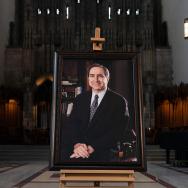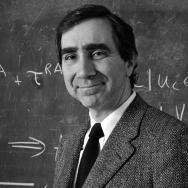Editor’s note: These are the full remarks delivered by Prof. Geoffrey Stone during a memorial for the late Hugo Sonnenschein on April 30, 2022, at Rockefeller Memorial Chapel. Read more about the memorial here.
In 1973, I joined the faculty of the University of Chicago as an assistant professor of law. Thus, by 1993, when Hugo Sonnenschein arrived as our new president, I had been a member of the faculty for 20 years, and for the six years immediately preceding Hugo’s arrival, because of the wisdom of President Hanna Gray, I had the privilege of serving as dean of our Law School.
By that time, I bled maroon, and I was deeply steeped in the romantic mythology of the University of Chicago, an institution that is unique in its celebration of its own character and values. The University’s mythology is captured by such familiar phrases as: the life of the mind; the University; a place where the air is electric with ideas; where students are taught not facts, theories or laws, but how to think; and where the proper response to even the most withering question is not resentment, but gratitude.
At the University of Chicago, we live deeply within our mythology. This is one of our great strengths. A powerful and positive mythology can create a sense of mission, a sense of character, a sense of destiny and a reason for being.
But such a mythology can also be a source of weakness. It can invite complacency and self-congratulation; it can invite too easy answers and a too ready acceptance of things “as they are.”
When I first met Hugo, I discovered right off the bat that, in true University of Chicago fashion, he always asked the hardest questions. He was inquisitive, rigorous, persistent and absolutely unforgiving of evasion. Familiar answers that invoked our mythology as definitive were simply not acceptable. No matter how much such answers might reaffirm what we like to believe, that was not good enough. Hugo always got to the facts, and then acted upon them.
Hugo fully embraced the values and aspirations of our University, but he understood that to preserve and protect those values into the future difficult decisions had to be made.
Over the years, I’ve had the privilege to know many academic leaders. I’ve observed that most of them follow the principle of “conservation of self.” They ask how they can add value to their institution, but at limited risk—limited risk of criticism, limited risk of difficulty, limited risk of failure.
But Hugo was different. As I soon discovered, he consistently asked, not how we could add value at reasonable risk to ourselves, but how we could add the most value, period. Hugo and I had many discussions about taking on difficult, sometimes seemingly impossible, challenges.
I often argued for a more modest, more cautious approach, a more limited risk; Hugo invariably opted for the long-term best interests of the University. I could never persuade him to make it easy on us. Hugo never put his own interest ahead of the University’s. He never once chose the path of least resistance.
In addition to asking the hardest questions and setting the highest standards for himself and for his University, Hugo demonstrated courage in the face of adversity. Not only was he willing to take on the hardest challenges, but he persisted. He never backed down because it was hard—even when it was harder than expected. There were several dark moments when everyone around Hugo wanted to throw in the towel because things had become too stressful, but Hugo did not waver, and in the end everything that needed to get done, did get done.
Hugo increased the size of the College and, at the same time, increased the academic excellence of our students. He instituted an ambitious campus master plan that resulted in a range of new buildings, including the Ratner Athletic Center, the Max Palevsky Commons, new research buildings for the Physical and Biological Sciences, and a redesigned Midway that converted it from being a barrier between the North and South campuses into being a welcoming crosswalk and park connecting the two. He created new academic programs, including the Center for the Study of Human Rights, the Center for the Study of Gender and Sexuality, and the Center for the Study of Race, Politics and Culture, to name just a few. And he dramatically increased the size of our endowment, substantially increased financial aid for our students, and significantly increased the salaries of our faculty.
There are many different styles of academic leadership—there are inspiring leaders, visionary leaders, collaborative leaders, and managerial leaders. But it is the courageous leader, the one who insists on asking the hardest questions, who is determined to take on the most fundamental issues, and who is prepared to weather obstacles, opposition, and personal risk, who will, in the long run, add the greatest and most lasting value to his institution.
I do not mean to imply, by the way, that Hugo never made mistakes, or was always right in his decisions, or was always subtle or deft or effective in explaining or in implementing them. Risk is, after all, risky, and an institution as embedded in its myths as ours has scant taste for some types of risk. I should add that, although Hugo was tough and always determined to do the right thing, he was also a sweet, caring and kind person. He loved to give hugs—even to me, and his warmth and affection were always present. Even at a University comprised of truly remarkable individuals, even at a University with a history of great and successful presidents, Hugo was extraordinary. He was the right man, at the right time, at the right place.
When Hugo first invited me to become his provost in the summer of ’93, I hesitated. I was still very much engaged as dean of our Law School and still had much to do. Besides, as I told Hugo, I’m not by nature a No. 2. He said he didn’t want a No. 2, but a partner.
Frankly, I was rather dubious about this, but he eventually wore me down through a very fancy dinner, several lengthy phone calls, and a number of handwritten love notes, which alternately appealed to my sense of responsibility, challenged my manhood and massaged my ego. It was undoubtedly the ego massage that clinched the deal. As Hugo clearly understood, sometimes it helps to tell a person what he already thinks of himself.
At the University of Chicago’s Convocation, long-standing tradition dictates that in the processional, after all the graduating students, the faculty, the deans, the officers and the trustees have entered in pairs, the president enters last, walking alone, immediately preceded by the provost. At the very first Convocation in which I participated as provost, as we were just about to enter Rockefeller Chapel, and after we’d been lined up in proper order by the marshal, Hugo, in a gesture that was symbolically expressive of what he meant by partnership, that was reflective of his character and his modesty, and that was constitutive of our relationship for the years to come, gently took my arm, pulled me back and said, “Walk with me.”
I am proud to say that I have ever since, and will continue to do so for the rest of my days.

